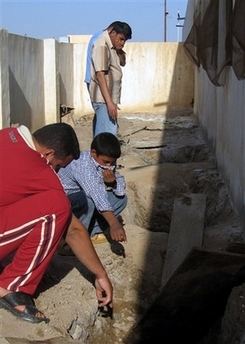17 bodies found in Ramadi
(AP)Updated: 2007-04-18 09:41
BAGHDAD - Police in Ramadi uncovered 17 decomposing corpses buried beneath two schoolyards in a district that until recently was under the control of al-Qaida fighters. At least 85 people were killed or found dead across the country Tuesday.
 Iraqi schoolchildren inspect holes where buried bodies were found, in their school yard in Ramadi, 115 kilometers (70 miles) west of Baghdad, Iraq, Tuesday, April 17, 2007. [AP]  |
He said one body had not yet been recovered from a separate burial site behind one of the schools because authorities feared it was booby-trapped with a bomb.
Ramadi had been a stronghold of Sunni insurgents and al-Qaida fighters until recently, when the U.S. forces in the region and the Iraqi government successfully negotiated with many local tribal leaders to split them off from the more militant insurgent groups.
Thousands of young Sunni men have joined the police force in Anbar province and have taken up the fight against the Islamic State of Iraq, the umbrella organization that includes al-Qaida.
In a sign that Shiite death squads are on the move again after more than two months of quiescence, 25 bodies, most tortured, were found dumped in Baghdad on Tuesday. Radical Shiite cleric Muqtada al-Sadr ordered his six Cabinet ministers Monday to quit the government.
In addition to the deaths in Baghdad and Ramadi, officials reported at least 42 other people were killed or found dead across Iraq Tuesday in nearly two dozen other violent incidents at sites that included Mosul, Fallujah, Baqouba and Tal Afar.
Prime Minister Nouri al-Maliki, meanwhile, said his government was talking with some Sunni insurgent groups, including members of Saddam Hussein's former regime, as he struggled to reconcile disaffected and violent bands of fighters.
And in separate attempts to ease sectarian divisions, a group of senior Sunni Muslim clerics visited Iraq's top Shiite cleric, Grand Ayatollah Ali al-Sistani, in the holy city of Najaf. They emerged from the meeting and said followers of the two sects were "brothers."
"Everybody's aim is to extinguish the fire of strife in our country. This is our call to everyone," said Sheik Mohammed Talabani, head of the Clerics Association in Kurdistan.
Iraq's Sunni mufti, Sheik Jamaluddin al-Dabban, said al-Sistani sent his regards to all Sunni scholars in the country. "We call for unity," al-Dabban said.
A third cleric from the Kurdish city of Irbil, Sheik Ali al-Khafaji, said: "Our aim is Iraq's unity. There is no difference between Sunnis and Shiites. They are all our brothers."
Sunni clerics have frequently visited al-Sistani in the past. This time they also visited three other top Shiite clerics in Najaf.
Al-Maliki did not name the groups with which his government was in contact but said he hoped the discussions laid the groundwork for reconciliation during a major meeting on Iraq scheduled for May 3-4 in the Egyptian resort of Sharm el-Sheik.
"We are having meetings with groups that are not part of the political process. ... They asked us not to reveal their names," al-Maliki told reporters at his office in Baghdad's heavily fortified Green Zone.
Meanwhile, hundreds of residents of Basra, Iraq's second-largest city, crowded into a huge tent erected Tuesday in front of the governor's office for the start of a three-day sit-in to demand his resignation.
"This governor is a hypocrite. We want him to come out!" the angry mob shouted. "We demand the Basra governor resign," read a banner hung from the tent. Gov. Mohammed al-Waili was not believed to be in the building.
The peaceful sit-in began a day after thousands of people paraded from a downtown mosque to al-Waili's office in a demonstration that defied orders from Baghdad officials. Residents of Basra, 340 miles southeast of Baghdad, have long complained of poor city services — garbage pickup, water and electricity.
Demands for al-Waili's ouster were thought to stem from political disagreements as well. He is a member of a rival Shiite faction to that of al-Sadr, the rebellious but extremely popular cleric who commands tremendous influence over Iraq's majority Shiites.
On Monday, al-Sadr's six ministers quit the Iraqi Cabinet to protest al-Maliki's refusal to back calls for a timetable for U.S. withdrawal.
The U.S. military on Tuesday announced the death of a Marine from a
"non-hostile incident" while on combat patrol in western Anbar province. The
incident occurred Monday and was under investigation.
|
||
|
||
|
|